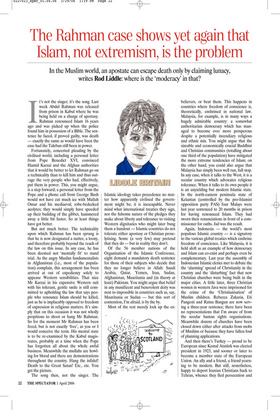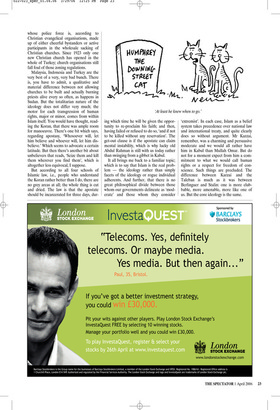The Rahman case shows yet again that Islam, not extremism, is the problem
In the Muslim world, an apostate can escape death only by claiming lunacy, writes Rod Liddle: where is the ‘moderacy’ in that?
It’s not the singer; it’s the song. Last week Abdul Rahman was released from prison in Kabul where he was being held on a charge of apostasy. Rahman renounced Islam 16 years ago and was picked up when the police found him in possession of a Bible. The sentence he faced, if proved guilty, was death — exactly the same as would have been the case had the Taleban still been in power.
Fortunately, concerted pleading by the civilised world, including a personal letter from Pope Benedict XVI, convinced Hamid Karzai and the Afghan authorities that it would be better to let Rahman go on a technicality than to kill him and thus outrage the very people who had, effectively, put them in power. This, you might argue, is a step forward; a personal letter from the Pope and a phone call from George Bush would not have cut much ice with Mullah Omar and his mediaeval, robe-bedecked acolytes; they would simply have speeded up their building of the gibbet, hammered away a little bit faster. So at least things have got better.
But not much better. The technicality upon which Rahman has been sprung is that he is now designated a nutter, a loony, and therefore probably beyond the reach of the law on this issue. In any case, he has been deemed not ‘mentally fit’ to stand trial. As the angry Muslim fundamentalists in Afghanistan (i.e., most of the population) complain, this arrangement has been arrived at out of expediency solely to appease Western sensibilities. That nice Mr Karzai in his expensive Western suit with his tolerant, gentle smile is still committed to upholding the law that says people who renounce Islam should be killed, just as he is implacably opposed to freedom of expression in religious matters. It’s simply that on this occasion it was not wholly propitious to shoot or hang Mr Rahman. So for the moment Mr Rahman has been freed, but is not exactly ‘free’, as you or I would conceive the term. His mental state is to be re-examined by the Kabul magistrates, probably at a time when the Pope has forgotten all about the whole awful business. Meanwhile the mullahs are howling for blood and there are demonstrations throughout the country. Hang the infidel! Death to the Great Satan! Etc., etc. You get the picture.
The song then, not the singer. The Islamic ideology takes precedence no matter how apparently civilised the government might be; it is inescapable. Never mind what international treaties they sign, nor the fulsome nature of the pledges they make about liberty and tolerance to visiting Western dignitaries who might later bung them a handout — Islamic countries do not tolerate either apostasy or Christian proselytising. Some (a very few) may pretend that they do — but in reality they don’t.
Of the 56 member nations of the Organisation of the Islamic Conference, eight demand a mandatory death sentence for those of their subjects who decide that they no longer believe in Allah: Saudi Arabia, Qatar, Yemen, Iran, Sudan, Afghanistan, Mauritania and (in theory at least) Pakistan. You might argue that belief in any munificent and benevolent deity was next to impossible in countries such as, say, Mauritania or Sudan — but this sort of contention, I’m afraid, is by the by.
Most of the rest merely lock up the ex believers, or beat them. This happens in countries where freedom of conscience is, theoretically, enshrined in national law. Malaysia, for example, is in many ways a hugely admirable country: a somewhat authoritarian democracy which has managed to become ever more prosperous despite a potentially incendiary religious and ethnic mix. You might argue that the sizeable and economically crucial Buddhist and Christian communities (totalling about one third of the population) have mitigated the more extreme tendencies of Islam; on the other hand, you could also argue that Malaysia has simply been well run, full stop. In any case, when it talks to the West, it is a secular country which advocates religious tolerance. When it talks to its own people it is an unyielding but modern Islamic state. In the north-eastern peninsula state of Kelantan (controlled by the pro-Islamist opposition party PAS) four Malays were last year sentenced to 20 months in prison for having renounced Islam. They had sworn their renunciations in front of a commissioner for oaths. Jail was the result.
Again, Indonesia — the world’s most populous Islamic country — is a signatory to the various global treaties which enshrine freedom of conscience. Like Malaysia, it is held aloft as an example of how democracy and Islam can co-exist and perhaps even be complementary. Last year the assembly of Indonesian Islamic clerics met to debate the the ‘alarming’ spread of Christianity in the country and the ‘disturbing’ fact that new Christian churches were being built in the major cities. A little later, three Christian women in western Java were imprisoned for the crime of the ‘Christianisation’ of Muslim children. Rebecca Zakaria, Eti Pangesti and Ratna Bangun are now serving a three-year sentence; there have been no representations that I’m aware of from the secular human rights organisations. Meanwhile dozens of churches have been closed down either after attacks from mobs of Muslims or because they have fallen foul of planning applications.
And then there’s Turkey — proud to be European since Kemal Atatürk was elected president in 1923, and sooner or later to become a member state of the European Union. An ally and a friend, a friend yearning to be modern. But still, nonetheless, happy to deport Iranian Christians back to Tehran, whence they fled persecution and whose police force is, according to Christian evangelical organisations, made up of either cheerful bystanders or active participants in the wholesale sacking of Christian churches. Since 1923 only one new Christian church has opened in the whole of Turkey; church organisations still fall foul of those zoning regulations.
Malaysia, Indonesia and Turkey are the very best of a very, very bad bunch. There is, you have to admit, a qualitative and material difference between not allowing churches to be built and actually burning priests alive every so often, as happens in Sudan. But the totalitarian nature of the ideology does not differ very much; the motor for each transgression of human rights, major or minor, comes from within Islam itself. You would have thought, reading the Koran, that there was ample room for manoeuvre. There’s one bit which says, regarding apostasy, ‘Whosoever will, let him believe and whoever will, let him disbelieve.’ Which seems to advocate a certain latitude. But then there’s another bit about unbelievers that reads, ‘Seize them and kill them wherever you find them’, which is altogether less equivocal, I suppose.
But according to all four schools of Islamic law, i.e., people who understand the Koran rather better than I do, there are no grey areas at all; the whole thing is cut and dried. The law is that the apostate should be incarcerated for three days, dur ing which time he will be given the opportunity to re-proclaim his faith; and then, having failed or refused to do so, ‘and if not to be killed without any reservation’. The get-out clause is if the apostate can claim mental instability, which is why lucky old Abdul Rahman is still with us today rather than swinging from a gibbet in Kabul.
It all brings me back to a familiar topic; which is to say that Islam is the real problem — the ideology rather than simply facets of the ideology or rogue individual adherents. And further, that there is no great philosophical divide between those whom our governments delineate as ‘moderate’ and those whom they consider ‘extremist’. In each case, Islam as a belief system takes precedence over national law and international treaty, and quite clearly does so without argument. Mr Karzai, remember, was a charming and persuasive moderate and we would all rather have him in Kabul than Mullah Omar. But do not for a moment expect from him a commitment to what we would call human rights or a respect for freedom of conscience. Such things are precluded. The difference between Karzai and the Taleban is much as it was between Berlinguer and Stalin: one is more clubbable, more amenable, more like one of us. But the core ideology is the same.



























































































 Previous page
Previous page